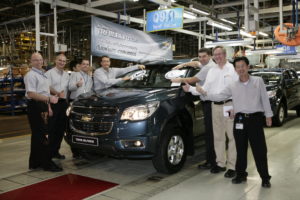Huge reboot: What Trump’s aversion to trade blocs could mean for the US robotics, automation and manufacturing industries
The US automotive manufacturing industry is probably going through some angsty times right now, what with president-elect Donald Trump reiterating his campaign pledge to repeal or at least renegotiate the Trans-Pacific Partnership, the North American Free Trade Agreement, and any other free-trade deal previous administrations have signed up to.
For a highly globalised industry like the automotive sector, which sources parts from all over the world and may assemble its vehicles in any number of countries simultaneously based on a common platform, this is perhaps one election promise which it would rather not be kept.
However, Trump has already produced a presidential address style video in which he says: “I am going to issue a notification of intent to withdraw from the Trans-Pacific Partnership, a potential disaster for our country.
“Instead, we will negotiate fair, bilateral trade deals that bring jobs and industry back onto American shores.”
 Previously, Trump has called Nafta the “worst trade deal ever” and said he would impose a 35 per cent tariff on Mexican-assembled autos and other goods, which would be possible if the US ended its participation in the trade pact.
Previously, Trump has called Nafta the “worst trade deal ever” and said he would impose a 35 per cent tariff on Mexican-assembled autos and other goods, which would be possible if the US ended its participation in the trade pact.
It’s probably too early to say exactly how leaving trading blocs like Nafta and TPP will eventually affect the auto industry. As pointed out in an article on the Wall Street Journal website, the situation is complicated. “The tens of thousands of parts that make up any vehicle often come from multiple producers in different countries and travel back and forth across borders several times.”
The three countries in Nafta are Canada, Mexico, and the US. The 12 countries in TPP are Australia, Brunei, Canada, Chile, Japan, Malaysia, Mexico, New Zealand, Peru, Singapore, Vietnam, and the US.
One for the robot
One of the reasons why so many people in the US are thought to have voted for Trump was that they want to see jobs – and, in particular, manufacturing jobs – return to the US. And automakers, being both a huge employer in the US and a globally significant manufacturing industry, will be under the spotlight.
According to a report by the International Federation of Robotics, the US auto industry buys around half of all industrial robots sold in the US. Around 30,000 industrial robots are sold each year in the US.
That figure was forecast by the IFR to be growing at a rate of 5 per cent annually. But now that the US looks likely to be competing with countries like China, Japan and others for a greater share of the manufacturing market, significantly more robotics and automation technology may be finding their way into increasingly smart American factories, all connected to the internet of things.
“The automobile industry is currently displaying the fastest rate of modernisation within Nafta,” says the IFR in its report. “The drive towards automation has been running at full pelt for five years now.
“The is enabling car manufacturers and suppliers in the US to supply the world’s largest domestic market and to produce the greatest number of cars and light commercial vehicles – after China.”
The IFR adds: “The USA is witnessing very intense investment in the technical renewal of its domestic manufacturing, aimed at improving competitiveness and partly at regaining capacities from abroad.”
If orders for robotics and automation technologies do increase in the US over the next few years, chances are that are a lot of them will be bought from local – as in North American – companies.
Industry association A3 calculated that a total of 14,583 robots were ordered from North American companies during the first half of 2016, valued at approximately $817 million in total.
The number of units ordered in the first six months marks a new record to begin the year, growing 2 per cent over the same period in 2015, which held the previous record.
Related to robots
In a separate survey by business consultancy Deloitte, American CEOs were asked what they thought were the most important advanced manufacturing technologies.
The answers Deloitte found were as follows:
- Predictive analytics
- Smart, connected products (internet of things)
- Advanced materials
- Smart factories (IoT)
- Digital design, simulation and integration
- High-performance computing
- Advanced robotics
- Additive manufacturing (3D printing)
- Open source design / direct customer input
- Augmented reality (to improve quality, training, expert knowledge)
- Augmented reality (to increase customer service and experience)
Deloitte concluded that the US will regain ground perceived to have been lost to other nations, and become the most competitive manufacturing country in the world by 2020.

